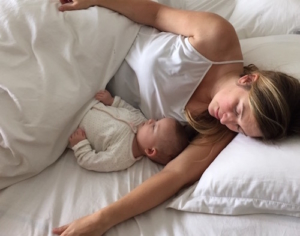
Source: ISIS Co-Sleeping Image Archive
I work with a lot of families, and something they almost all inevitably struggle with are the periods of sleep regressions that accompany so much of the first couple years of our children’s lives. The reduction in sleep due to teething, learning to walk, growth spurts, learning to talk, cognitive development, social development, and so on leaves families not only tired, but questioning everything they have done up to that point. Specifically, wondering what they have done wrong.
For many families, these periods represent a period of something lost. A skill their child once had seems to have disappeared completely. This way of thinking is what makes something like “Oh you’ve created the wrong sleep associations” so very tantalizing to many families and they end up falling prey to the extinction sleep training camp. As such, I think it is incredibly important to dispel this myth – yes, it’s a myth – and perhaps start thinking of using different terminology altogether to help our kids and ourselves better understand what’s happening.
Why “Regression” Is Wrong
First, let’s look at what a regression is. By definition, regression means a return to a former or less developed state or a trend or shift toward a lower or less perfect state. Merriam-Webster provides the following four examples:
- Progressive decline of a manifestation of a disease
- Gradual loss of skills or memories or functions due to aging or disease
- Reversion to an earlier mental or behavioural level
- The statistical relationship
It’s no wonder when people hear the word, they start thinking of skills lost, even though the initial reason for the use of “regression” as a term for sleep is that it just refers to the previous state of greater arousals and awakenings. The part to do with development or skills just simply has no bearing here. In fact, many “sleep regressions” occur during periods of greater development resulting in the antithesis of the less developed state.
However, even when we look at what is happening with sleep during the periods, it is difficult to believe that it’s even just a return to a former state. Sleep isn’t the same. Yes, our children may wake more, but it’s not like the newborn waking that happens frequently but (hopefully) without other associated behaviours. When our children go through a developmental leap, their sleep disruptions are often accompanied by other behaviours such as movement in sleep (when learning new motor skills), talking in sleep (when acquiring expressive language), crying (when acquiring teeth or physically growing), or nightmares (when experiencing separation anxiety). Their sleep hasn’t devolved, but has truly shifted and changed.
What is Happening?
If children aren’t losing much-needed skills to help them sleep, what is happening? First let’s make it clear that your children still have the same skills they had before. When they were actively self-settling or able to fall asleep once in a while without help, those skills are still there. It’s just that those skills are still only doable when there is minimal interruptions. This is why you knew your child couldn’t engage in any behaviour like that when they were sick – illness prevented them from using their skills. With leaps, it’s the same except instead of feeling crummy being the culprit, the various developmental changes taking place are the issue at hand. These leaps tax our children’s systems in ways that make it much harder for them to use the skills they have in place.
This isn’t surprising given how new these skills are for them. I like to think of it as being like a person starting a diet. If you’ve never gone on an elimination diet, it’s hard at first and soon you are able to do it well enough if it’s easy. That is, you can avoid whatever it is you’re eliminating if you have other foods readily available, the time to prepare healthier choices, you aren’t over-hungry, you aren’t stressed, and so on. As you get practice this skill of eliminating certain foods, you’ll be able to do it in some more difficult circumstances, but chances are it’ll still be taxing in other cases.
Or perhaps consider learning to drive. At first it’s stop and go, but with practice (with a supportive individual who helps you feel safe and secure thereby reducing your own anxiety), you get better. However, being able to drive on quiet streets at a slow speed is one thing. Moving to a busy road is another and often results in greater anxiety and some mistakes that weren’t present on the slower roads. Again, with highway driving we see the need for assistance and support again as the skill of driving is tested and our skill level increases again. But even then, some of us veteran drivers find ourselves in situations that make us fearful and anxious on the road (Autobahn anyone?) and we’ll require periods of support and assistance to help us through them.
For our children, these leaps represent very difficult situations and their limited skills (especially with respect to sleep) make it that much harder for them to utilize any skill they’ve learned. They are being taxed beyond what they are capable of coping with themselves. This isn’t too surprising given how long it takes for physiological and neurological development to take place. For example, the prefrontal cortex is still considered immature at age 5 (and isn’t fully mature until our mid-20s) which means the ability to control oneself is hugely limiting. Emotion regulation (colloquially referred to as “self-soothing”) is known to take years to develop and is reliant upon co-regulation in the early years before active emotion regulation takes place. In short: These leaps and difficulties make it impossible for our children to utilize the limited skills they have developed. Much like too much distress makes it impossible to use our emotion regulation skills.
What Can We Do?
The main action you can do is to be there to support your child. My main goal here is to get parents to think differently about these periods of regressions because our fear of lost skills often leads to the idea that we need to somehow retrain our kids when in fact they simply need more assistance to learn how to cope with these more difficult situations. And yes, assistance is exactly the right word because our children need – above all else – to feel safe and secure and that comes from knowing we are there for them during turbulent and difficult times.
Please know that these leaps will end and our kids will return to being able to use their limited skills (and may even have developed some new ones in the process). You don’t need to retrain them and in fact that won’t do much for them in these moments. If we return to the driving analogy, when we struggle in an intense situation without any help or reassurances from those around us, we often end up out of the car insisting we will never do that again. That’s not how we want our kids to think of sleep. We want them to come out of these leaps with the knowledge that they have support because this support is what allows them to flourish.






[…] still won’t be sleeping in Month Four. It doesn’t exactly go out the window, because it’s not really a regression, but who cares about semantics when you’re not […]
Awesome, thank you! My 18-month-old is napping mostly in-arms right now. It is nice to get confirmation that what she needs is support and I am available to help her. She is talking up a storm and noticeably growing and developing in so many areas.
My almost 18 month old is suddenly fighting naps and waking up screaming in the middle of the night. Just wondering if this happened to your child and how you handled it. He falls asleep in his crib awake without any assistance but has been waking up screaming and cant get back to sleep in the middle of the night so we have been bringing him into our bed but are fearful we are creating a worse problem. We dont have the heart to leave him in his room alone if hes scared or needs us
Hi there my LO is doing the exact same thing. Did it finally pass? Any tips?
This sounds really dreamy but also a bit out of touch with the reality of most parents… If a baby who was sleeping for 5 hours at 3 months, suddenly starts waking every hour and continues to do that for the next several months, is she really struggling with a leap for that long? What’s an exhausted parent to do? Just hope that at some unknown point in the future, their child will be sleeping better? And what happens to the relationship between the parent and child during these exhausting times? My child wakes up every morning with a big yawn and rubbing her eyes. She is cranky all day and when I place her on her playmat, she just lays there and grunts until I pick her up and manually move her limbs for her or try to nap her. Sleep has been a struggle for her for the last 6 weeks. And it’s catching up with me too. Being a single parent, I often go hungry because I can’t put my kid down long enough to cook a meal, I am grumpy, forgetful and less motivated to interact with my child during the day because I’m so tired. When she wakes up for the 8th time at 2 AM, I am that much more likely to lose my temper and yell at her in anger. Not to mention that I’m worried about our safety when I forget to turn off the oven or lock the door or worry that I will fall into a really heavy slumber and not notice if my baby has stuffed her face into my pillow. (the only way I can get her to sleep is to put her next to me on the bed but I don’t feel safe doing that anymore). These ideals of being supportive no matter what are nice to strive for but their preachers often fail to acknowledge that the very thing they aim to promote, a strong attachment and a mutual bonding between parent and child, is at jeopardy when parents are constantly made to feel guilty for wanting some rest and comfort for themselves or for wanting to have some structure and are pushed too far.
I really feel for parents who have no family around to help out when babies are teething , etc. My experience with babies was that I did not have to go to a job. My time was my own and I had my husband to assist at night . There was no internet so I did not second guess my parenting decisions. I slept with my babies(co-sleeping until???) and nursed on demand. My sister and mother-in-law were always around to help with housework and cooking during those first months. My wish is that all new parents could have my experience.
Naz. It’s tough, I know that. I am not a single parent by definition but we work and therefore sleep split shifts so that our child doesn’t have to go to daycare. This results in us effectively being single parents.
I understand the impulse to get frustrated and angry in the moment when you’re exhausted and baby is standing at the edge of the crib screaming uncontrollably out of a dead sleep for the 7th time that night.. It’s just got to be suppressed though, at least in the presence of your child.
It’s ok to let your child cry for five minutes in the crib so you can go to another room, take a few deep breaths, and reset your demeanor so you can be supportive even when you don’t feel it.
I find the few minutes and breathing, followed by telling my son how much I love him and what a blessing he is to my life even in tough times (I couldn’t even imagine a life without him) in a calm, soothing manner actually helps him to calm, but also me.
Every baby is different and some are particularly challenging. Good luck!
[…] are legitimate reasons why our babies and toddlers cycle through extremely intense and wakeful patches throughout their […]
[…] • https://gku.flm.mybluehost.me/evolutionaryparenting.com/sleep-regressions-why-its-not/ […]
[…] assured, just because it’s called a “regression,” there’s no evidence to show that your baby’s sleep is actually regressing in any way, but it’s still important to […]
[…] Evolutionary Parenting with Tracy Cassels Phd, “Sleep Regressions”: Why It’s Not Actually a Regression, https://gku.flm.mybluehost.me/evolutionaryparenting.com/sleep-regressions-why-its-not/ […]